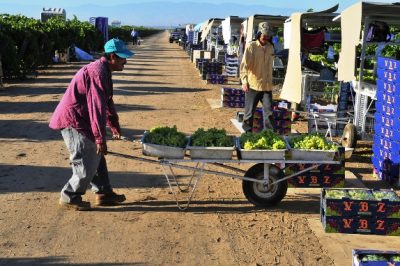Low Wage
Immigrants not only bring diverse skills and perspectives to the U.S. workforce, they often fill employment gaps in crucial fields. We advocate for expanded work visas and related programs so our labor force can continue to benefit from immigrant workers and remain competitive in the global economy

Senate’s Symbolic Bill Rings Opening Bell on Immigration Reform
This week, the White House revealed that President Obama will lay out a proposal for immigration reform at a speech in Nevada next week. The visit to the home state of Senate Majority Leader Harry Reid may reflect the strong support Reid and Nevada Latinos have given to Obama. It also follows Senator Reid’s clear message this week of his ongoing intent to press for immigration reform by putting it at the top of the Senate legislative priorities list for the 113th Congress. Although symbolic, the first bill introduced in the Senate this year, S. 1, is a bill to reform America’s broken immigration system or “The Immigration Reform that Works for America’s Future Act.” It contains ten principles for reform that reflect much of the common wisdom on what is needed to create a working and productive immigration system. Now, all we need is the actual bill. Read More

Agriculture Industry Harmed by Restrictive State Immigration Laws
The American agricultural industry is facing billions of dollars in losses due to labor shortages resulting from recent anti-immigrant laws passed in various states around the country. The American farming industry is heavily dependent on undocumented workers, and according to a recent article in Time Magazine, has had an extremely difficult time replacing those who have fled as a result of laws like Arizona’s SB 1070 or Alabama’s HB 56. Read More

The Politics of Skill: Rethinking the Value of “Low-Skilled” Immigrant Workers
The political discourse surrounding the incorporation of immigrants into the U.S. labor market tends to sort immigrant workers into two broad and mutually exclusive categories: high-skilled workers who are valued by many for their contribution to economic growth, and low-skilled workers who are viewed by some as causing a glut in the U.S. labor market and thereby displacing low and middle-income native-born workers. For the most part, these categories are structured around formal education. Workers possessing a level of formal education equal or superior to the median in the United States are on one side of this divide, while workers with less formal education than that threshold are on the other. Most current proposals favor expanding immigration opportunities for those immigrants with high levels of formal education. Read More

Lamar Smith Introduces New Agricultural Twist to His Anti-Immigrant Agenda
Rep. Lamar Smith (R-TX), Chairman of the House Judiciary Committee, has added a novel new twist to his anti-immigrant agenda: letting more immigrant workers into the country. In defiance of logic, the man who believes that immigrants merely steal jobs from U.S. citizens now wants to import migrant agricultural workers. At a hearing today of the House Subcommittee on Immigration Policy and Enforcement, Rep. Smith rolled out his latest legislative proposal, called the “American Specialty Agriculture Act” (H.R. 2847). The bill would create a new “H-2C” visa for temporary agricultural workers to replace the existing H-2A program, and would allow growers to bring in up to 500,000 of these workers each year. Read More

Facts about Farmworkers
AgJOBS is a bipartisan, compromise bill that is the result of years of negotiations among farmworkers, growers, and Members of Congress. Get the facts on Farmworkers. Read More

Immigration and the Elderly: Foreign-Born Workers in Long-Term Care
Aging populations and the growing need to provide long-term care to the elderly are among the leading demographic, political, and social challenges facing industrialized countries, including the United States. As of 2004, 34.7 million people in this country had lived to their 65th birthday or beyond, accounting for about 12 percent of the U.S. population. Nearly 90 percent of the elderly population is native-born. By 2030, the number of older people in the United States is likely to double, reaching 72 million—or nearly one out of every five people. The aging of larger numbers of Americans will require significant increases in financial and human resources for healthcare support and other social services. As a result, immigrants will continue to play a significant role in the growth of the U.S. labor force in general and of the direct-care workforce in particular. It is in the best interests of long-term care clients, providers, and workers if governments and private donors foster high-quality training and placement programs rather than leaving the future of the direct-care industry to chance. Read More

Dollars without Sense: Underestimating the Value of Less-Educated Workers
A recent report from the Heritage Foundation is one in a long line of deeply flawed economic analyses which claim to estimate the contributions and "costs" of workers based solely on the amount of taxes they pay and the value of the public services they utilize. Read More

No Way In: U.S. Immigration Policy Leaves Few Legal Options for Mexican Workers
Current immigration policies are completely out of sync with the U.S. economy’s demand for workers who fill less-skilled jobs, especially in the case of Mexican workers. While U.S. immigration policies present a wide array of avenues for immigrants to enter the United States, very few of these avenues are tailored to workers in less-skilled occupations. It should come as no surprise, then, that immigrants come to or remain in the United States without proper documentation in response to the strong economic demand for less-skilled labor. Read More

Labor Market Numerology: Arbitrary Congressional Limits on Temporary Worker Visas
The current numerical limits on visas for both high-skilled and seasonal workers prevent U.S. businesses from hiring the workers they need, while doing nothing to protect the jobs or wages of native workers. Labor rights are most effectively guaranteed by enforcing labor protections, not by imposing arbitrary numerical caps. Read More

Mexican Immigrant Workers and the U.S. Economy: An Increasingly Vital Role
America's current immigration policies are antiquated and fail to recognize the importance of Mexican workers to the national economy. U.S. immigration law must provide ways for Mexican workers to enter and remain in the U.S., in both temporary and permanent status, with protections to assure that they have the dignity and respect they deserve, given the important contributions they make to America. The status quo can no longer be accepted if the United States is to remain the world's leading economy. Read More
Make a contribution
Make a direct impact on the lives of immigrants.
